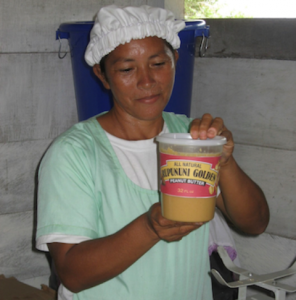Launched in 2005, the Aranaputa peanut butter factory is a locally-run cooperative, supplying its product to families, schools and lodges across the Rupununi, while providing employment for workers from the surrounding villages.
Around 700 acres of Rupununi farmlands are dedicated to peanut cultivation, much of which is channelled to the Aranaputa cooperative. The peanut butter cooperative serves an important role in local economic development by giving farmers a local outlet for their produce, while providing affordable, hygienic, nutritional, locally-produced food to community residents.




